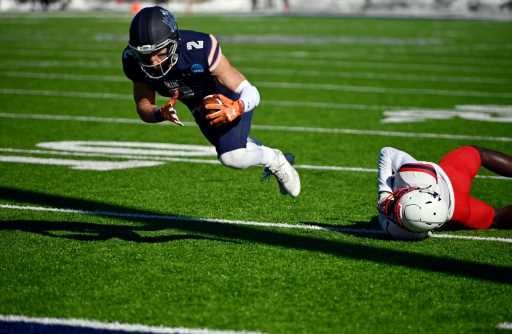GOLDEN — As Colorado School of Mines teammates circled around the two, wide receiver Josh Johnston lined up against fellow outside linebacker Mack Minnehan for a drill in the fall of 2017.
In an athletic stance, ready to go, Minnehan stopped the drill, then handed Johnston an envelope containing a scholarship
The walk-on from Snohomish, Wash., was mobbed at the 50-yard line. At that point, he knew he was in it for the long haul.
“As far as sticking around, it came to being with those dudes I met my freshman year,” Johnston said. “Guys like Mack, Kobe (Brewster), Matty (Armendariz), Cameron (Reller), we’ve stuck together since the dorms and we found our group.
“We found that from the older guys and the seniors in that class, the guys that were tight and the guys that stuck together were the ones who had the most success.”
With a roster featuring 33 seniors and six graduate students, Mines is an anomaly in today’s college football landscape: A program that has not lost one player to the transfer portal in the past two seasons. Johnston is among the latter group of graduates who stuck around for one last shot at bringing the Orediggers their first NCAA Division II title. They will get that chance Saturday when Mines (13-2) faces defending champion Ferris State (13-1) at 11 a.m. on ESPNU in McKinney, Texas.
Johnston will depart with at least 2,854 receiving yards plus a master’s degree in engineering-and-technical management. But first he’s looking to extend his football career a little bit further.
“I am currently planning on training for Pro Day — I think I’m gonna do it, should be exciting,” Johnston said. “Figured if you can’t play football again, you can work the rest of your life.”
For the other graduate students still at Mines, the decision to stay came down to two things: Getting a first-class education and raising the bar one last rung to a national championship-caliber program.
“It helps that we’re such an academically-focused school. Everyone wants to be an engineer or something adjacent to it,” redshirt senior center and AFCA first-team All-American Matt Armendariz said. “… Last year, we were three points away from reaching the national championship, and it hit everybody that we’re that close. It’s a really special group of guys and we wanted to leave (the program) better than when we came here.”
In 2015, Gregg Brandon came in after having coached at the Division I level since 1987. When he told others a national title was achievable at Mines, a few people “looked at me like I had six heads.” He hired strength coach Trevor Florendo and the pair mapped out position-by-position expectations. The coaches sought players who wanted to embrace the challenges that come with making deep playoff runs without compromising academics.
Recruiting efforts expanded and parameters changed. Season after season, as results improved, it meant a better chance to lure talent from one-day camps at academic-first FBS schools such as Stanford, Rice or Air Force.
“It’s because of the quality of the degree, the education. A lot of them could walk on at Texas A&M or CU but it’s hard to do that and make it. Instead, they say, ‘Hey, I’m gonna take my opportunity at Mines because of the academics and they play some great college football,’” Brandon said. “… Once they get in and make the adjustment, we make it an environment where you put in the work to succeed and that’s what that class did. They all stuck it out and we built a championship culture, and (current) coach (Brandon) Moore has only built upon that.”
For Wheat Ridge native Michael Zeman, Colorado’s all-time collegiate leader in touchdowns (64) and the program’s top rusher all time (4,437 yards and counting), that championship culture was evident in his first day of meetings, when he looked along the wall at his new teammates back in 2017. He admitted he went in a bit timid.
Now, Zeman said what unites his teammates is a shared bond of going through college together — an intangible in modern college football that can’t be overlooked.
“It’s so tight-knit. You’re in classes, you’re struggling together, failing tests together,’” Zeman said. “Right away, you learn that these are the guys that they know how to deal with (the academic rigors), they know how to get through it all. And I think it’s brought the team closer together.”
Source: Read Full Article






